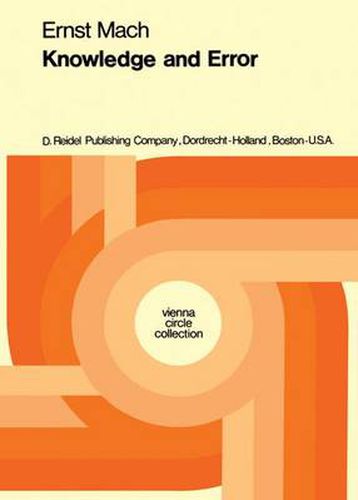Readings Newsletter
Become a Readings Member to make your shopping experience even easier.
Sign in or sign up for free!
You’re not far away from qualifying for FREE standard shipping within Australia
You’ve qualified for FREE standard shipping within Australia
The cart is loading…






This title is printed to order. This book may have been self-published. If so, we cannot guarantee the quality of the content. In the main most books will have gone through the editing process however some may not. We therefore suggest that you be aware of this before ordering this book. If in doubt check either the author or publisher’s details as we are unable to accept any returns unless they are faulty. Please contact us if you have any questions.
Erkenntnis und Irrtum. Skizzen zur Psychologie der Forschung. Von E. MACH Emer. Professor an der Unlversltlt Wlen. LEIPZIG Verlag von Johann Ambrosius Barth 1905. INTRODUCTION XIII On a number of occasions Mach expressed the sentiment, especially in his correspondence, that America was the land of intellectual freedom and opportunity, the coming frontier for a new radical empiricism that would help to wash metaphysics out of philosophy. In 1901 he sponsored the German edition of Concepts and Theories of Modern Physics (1881) 2 by J. B. Stallo, Cincinnati lawyer and philosopher. Mach warmly endorsed Stallo’s book because his scientific aims so closely approximated his own, and because Stallo rejected the latent metaphysical elements and concealed ontological assumptions of the mechanical-atomistic inter- pretation of the world. The second edition of Wiirmelehre was dedicated to Stallo in 1900. The fourth edition of Populiir-wissenschaftliche Vorlesungen (1910), containing seven new essays, was dedicated to Harvard Professor of physiology, philosophY, and psychology, William James. Mach had a strong intellectual affinity for James’ pragmatism because, like himself, he recognized that James had come to radically empirical views from science. Both men took pure pre-conceptualized experience, from which the mental and physical predicates of experience are composed, to be neutral rather than real, unreal, objective or subjective.
$9.00 standard shipping within Australia
FREE standard shipping within Australia for orders over $100.00
Express & International shipping calculated at checkout
This title is printed to order. This book may have been self-published. If so, we cannot guarantee the quality of the content. In the main most books will have gone through the editing process however some may not. We therefore suggest that you be aware of this before ordering this book. If in doubt check either the author or publisher’s details as we are unable to accept any returns unless they are faulty. Please contact us if you have any questions.
Erkenntnis und Irrtum. Skizzen zur Psychologie der Forschung. Von E. MACH Emer. Professor an der Unlversltlt Wlen. LEIPZIG Verlag von Johann Ambrosius Barth 1905. INTRODUCTION XIII On a number of occasions Mach expressed the sentiment, especially in his correspondence, that America was the land of intellectual freedom and opportunity, the coming frontier for a new radical empiricism that would help to wash metaphysics out of philosophy. In 1901 he sponsored the German edition of Concepts and Theories of Modern Physics (1881) 2 by J. B. Stallo, Cincinnati lawyer and philosopher. Mach warmly endorsed Stallo’s book because his scientific aims so closely approximated his own, and because Stallo rejected the latent metaphysical elements and concealed ontological assumptions of the mechanical-atomistic inter- pretation of the world. The second edition of Wiirmelehre was dedicated to Stallo in 1900. The fourth edition of Populiir-wissenschaftliche Vorlesungen (1910), containing seven new essays, was dedicated to Harvard Professor of physiology, philosophY, and psychology, William James. Mach had a strong intellectual affinity for James’ pragmatism because, like himself, he recognized that James had come to radically empirical views from science. Both men took pure pre-conceptualized experience, from which the mental and physical predicates of experience are composed, to be neutral rather than real, unreal, objective or subjective.